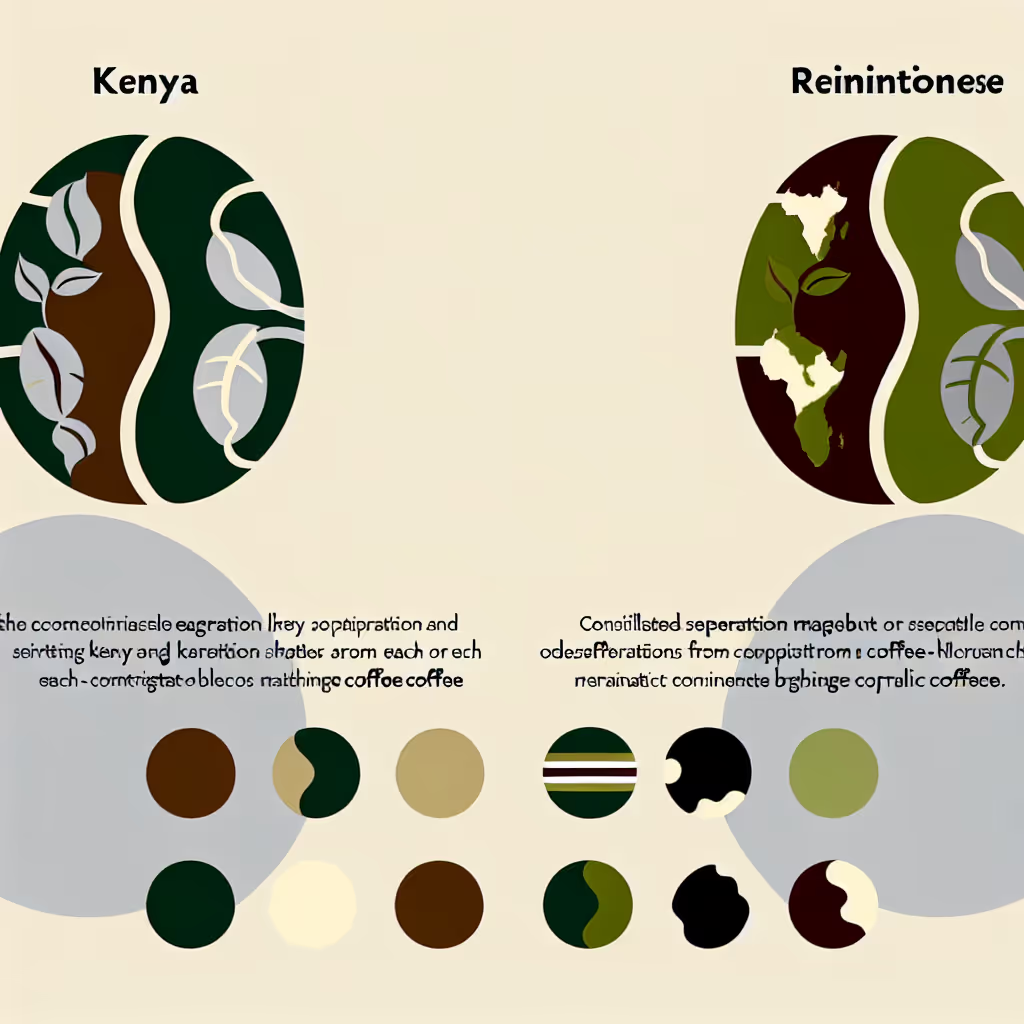Kenyan Vs. Burundian Coffee
This comparison explores the distinct qualities of Kenyan and Burundian coffees, highlighting their flavor profiles, growing conditions, and processing methods to help coffee enthusiasts make informed choices.

Brief Description
Kenyan coffee is renowned for its bright acidity, full body, and complex flavor profile. Grown in the rich volcanic soils of the Central Highlands, these beans benefit from ideal climate conditions and meticulous processing. The result is a cup that's bold, wine-like, and often described as the 'connoisseur's choice'. With notes ranging from blackcurrant to citrus, Kenyan coffee offers a truly unique and memorable tasting experience.
Burundian coffee is a hidden gem in the specialty coffee world. Grown in the highlands of this small East African nation, these beans offer a delightful complexity with bright acidity and a smooth, creamy body. The unique terroir of Burundi, combined with meticulous processing methods, results in a cup that's both vibrant and balanced, showcasing notes of citrus, berries, and subtle floral undertones. Despite facing challenges, Burundi's coffee industry continues to produce exceptional beans that are gaining recognition among coffee enthusiasts worldwide.
Importance of Comparison
Comparing Kenyan and Burundian coffees is crucial for coffee lovers seeking to explore the diverse flavors of East African beans. Both origins offer unique taste experiences, reflecting their specific terroirs and processing techniques. Understanding these differences helps consumers expand their palate, make informed purchasing decisions, and appreciate the nuances of specialty coffee from lesser-known regions.
Key Attributes
Origin
Kenyan
Burundian


Consumer Guide
When choosing between Kenyan and Burundian coffee, consider your flavor preferences. Kenyan coffee is known for its bold, wine-like acidity with blackcurrant and citrus notes, ideal for those who enjoy a bright, complex cup. Burundian coffee offers a more balanced profile with citrus, red berry, and floral notes, appealing to those who prefer a smoother taste. For brewing, both origins excel in pour-over and French press methods. Kenyan beans are great for cold brew, while Burundian beans shine in Aeropress. Consider the processing method: Kenyan coffees often undergo double fermentation, while Burundian coffees offer more variety with washed, natural, and honey processes. Lastly, think about supporting smaller coffee industries; choosing Burundian coffee can help promote this emerging origin.
Expert Opinions
Coffee expert James Hoffmann notes, 'Kenyan coffees are often the pinnacle of brightness and complexity, while Burundian coffees are an exciting, emerging origin with a softer, more approachable profile.' Barista champion Lem Butler adds, 'The double fermentation process in Kenya creates a unique depth, whereas Burundi's diverse processing methods offer a wider range of flavor experiences within a single origin.'
FAQs
Kenyan coffee is known for its bright acidity, full body, and complex flavors of blackcurrant and citrus. Burundian coffee offers a more balanced profile with citrus, red berry, and floral notes, along with a smoother, creamier body.
Both countries grow coffee at high altitudes, with Kenya typically ranging from 1400-2100m and Burundi from 1400-2000m. Kenya's Central Highlands have rich volcanic soil, while Burundi's highlands offer unique terroir. Both benefit from ideal climate conditions for coffee cultivation.
Both Kenyan and Burundian coffees excel in pour-over and French press methods. Kenyan beans are particularly good for cold brew, while Burundian beans perform well in Aeropress. Experiment with different methods to find your preferred taste profile for each origin.
Kenya has a larger coffee industry, producing around 50,000 metric tons annually. Burundi, being a smaller country with a developing coffee sector, produces about 15,000 metric tons per year. This difference in scale can affect availability and pricing of beans from each origin.
Kenyan coffees are typically washed and often undergo a unique double fermentation process before being sun-dried. Burundian coffees offer more variety in processing, including washed, natural, and honey methods, allowing for a wider range of flavor profiles within the origin.
For those new to specialty coffee, Burundian beans might be more approachable due to their balanced profile and smoother taste. However, if you're looking for a bold, distinctive flavor experience, Kenyan coffee can be an exciting introduction to the world of specialty coffee. Ultimately, trying both will help you understand your preferences.
Conclusion
Both Kenyan and Burundian coffees offer unique and rewarding taste experiences for coffee enthusiasts. Kenyan beans are celebrated for their bright acidity, full body, and complex flavors, making them a favorite among connoisseurs. Burundian coffee, while lesser-known, is gaining recognition for its balanced profile and smooth, creamy body. When choosing between the two, consider your flavor preferences, brewing methods, and desire to explore new origins. Whether you opt for the bold complexity of Kenya or the emerging excellence of Burundi, both origins promise to elevate your coffee experience and broaden your appreciation for East African beans.






